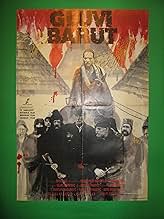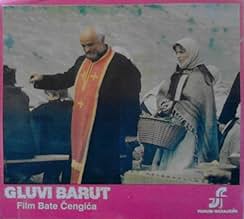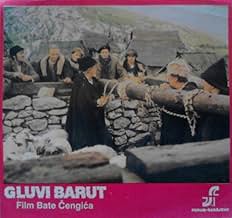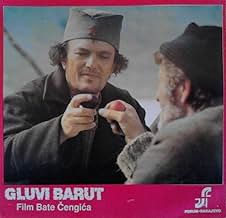अपनी भाषा में प्लॉट जोड़ेंWhen traditional Serbian populated village in Bosnia gets in the middle of two ideologies during World War II, two groups, communist and monarchist fight over the destiny of its population a... सभी पढ़ेंWhen traditional Serbian populated village in Bosnia gets in the middle of two ideologies during World War II, two groups, communist and monarchist fight over the destiny of its population among each other.When traditional Serbian populated village in Bosnia gets in the middle of two ideologies during World War II, two groups, communist and monarchist fight over the destiny of its population among each other.
- पुरस्कार
- 1 जीत और कुल 1 नामांकन
कहानी
फीचर्ड रिव्यू
This, the veteran Bosnian/Yugoslav director Bato Čengić's last true work, is a story that needed to be told: an alternative telling of the very important part of Bosnian and Yugoslav history, the world war 2 and its good guys, partisans. Gluvi Barut doesn't give as polished picture of the partisans as the earlier movies made in the glory days of Yugoslavia and its communist system but it is far from a judgmental film like for instance Četverored is. Its role was clear: Čengić wanted to make a film to remind the people what partisans really were, amidst a wave of increasingly liberal and anti-leftist films, mainly coming from Croatia.
The story's focal point is this difficult time of conversion from royalist to new communist/Marxist Yugoslavia during the world war 2. A mountain village in Bosnia has its own militia-like force which fights the Nazis, without directly being a part of Tito's partisan army. Their commander, a former officer of the royal Yugoslav army, played excellently by Branislav Lečić, is himself torn between the two sides and unsure which side to follow: whether to retain his allegiance to the old cause or to follow the new progressive Marxist line. Radekić is proud of his officer credentials but his partisan colleagues think little of it and treat them with disdain. After a partisan commissar gets murdered by two of the members of the peasant militia, the hard willed Spanac (Spaniard) is sent to find out what happened and to reinforce the discipline among the peasants. Mustafa Nadarević is also brilliant in this part. The relations between him and his unwilling subject Radekić are at first strained. Still, Radekić tries to make things better in a difficult situation and sympathizes the cause of the partisans, seeing that they do fight for the people. However, his fellow peasants are less willing to submit to the new yoke and denounce their national identity and religious traditions. This is what this film revolves around.
Another fine performance by Mira Furlan in the role of the widow peasant woman who is at first intimidated by Spaniard but later starts to develop genuine feelings for him, as she finds out he's a lonely and unhappy character. I think what's really good with this film is that at first the actions of the partisans are questioned, especially when Spanac executes some innocent peasants whom he suspected were involved in the murder of the commissar and were not willing to give up the real murderers. But as the film reaches its climax and we see Radekić make his decision to support the partisans and becomes one himself, we know that partisans are the better side here. Radekić is the only really flawless character here: he always thinks of the good of his people and doesn't join the partisan side until he carefully examines Spaniard and sees that he is true to his cause. Only then does he join partisans and then without any reservations. I find it heartwarming.
Gluvi Barut is about difficult times in difficult surroundings. The desolate mountain landscapes truly reflect the toughness of life and the rough nature of its inhabitants. Spaniard is like some alien who has arrived here to make things better, but to make them better he at first has to make them worse. That is the message the director wanted to give I guess: to get things done in such a climate you sometimes have to get rough. The supporting cast is really fine and consisting of some of former Yugoslavia's finest actors. This is the real partisan movie and a realer one has never been made.
The story's focal point is this difficult time of conversion from royalist to new communist/Marxist Yugoslavia during the world war 2. A mountain village in Bosnia has its own militia-like force which fights the Nazis, without directly being a part of Tito's partisan army. Their commander, a former officer of the royal Yugoslav army, played excellently by Branislav Lečić, is himself torn between the two sides and unsure which side to follow: whether to retain his allegiance to the old cause or to follow the new progressive Marxist line. Radekić is proud of his officer credentials but his partisan colleagues think little of it and treat them with disdain. After a partisan commissar gets murdered by two of the members of the peasant militia, the hard willed Spanac (Spaniard) is sent to find out what happened and to reinforce the discipline among the peasants. Mustafa Nadarević is also brilliant in this part. The relations between him and his unwilling subject Radekić are at first strained. Still, Radekić tries to make things better in a difficult situation and sympathizes the cause of the partisans, seeing that they do fight for the people. However, his fellow peasants are less willing to submit to the new yoke and denounce their national identity and religious traditions. This is what this film revolves around.
Another fine performance by Mira Furlan in the role of the widow peasant woman who is at first intimidated by Spaniard but later starts to develop genuine feelings for him, as she finds out he's a lonely and unhappy character. I think what's really good with this film is that at first the actions of the partisans are questioned, especially when Spanac executes some innocent peasants whom he suspected were involved in the murder of the commissar and were not willing to give up the real murderers. But as the film reaches its climax and we see Radekić make his decision to support the partisans and becomes one himself, we know that partisans are the better side here. Radekić is the only really flawless character here: he always thinks of the good of his people and doesn't join the partisan side until he carefully examines Spaniard and sees that he is true to his cause. Only then does he join partisans and then without any reservations. I find it heartwarming.
Gluvi Barut is about difficult times in difficult surroundings. The desolate mountain landscapes truly reflect the toughness of life and the rough nature of its inhabitants. Spaniard is like some alien who has arrived here to make things better, but to make them better he at first has to make them worse. That is the message the director wanted to give I guess: to get things done in such a climate you sometimes have to get rough. The supporting cast is really fine and consisting of some of former Yugoslavia's finest actors. This is the real partisan movie and a realer one has never been made.
टॉप पसंद
रेटिंग देने के लिए साइन-इन करें और वैयक्तिकृत सुझावों के लिए वॉचलिस्ट करें
विवरण
- रिलीज़ की तारीख़
- कंट्री ऑफ़ ओरिजिन
- भाषा
- इस रूप में भी जाना जाता है
- Silent Gunpowder
- फ़िल्माने की जगहें
- उत्पादन कंपनियां
- IMDbPro पर और कंपनी क्रेडिट देखें
इस पेज में योगदान दें
किसी बदलाव का सुझाव दें या अनुपलब्ध कॉन्टेंट जोड़ें























